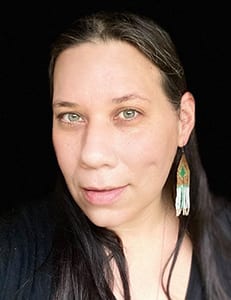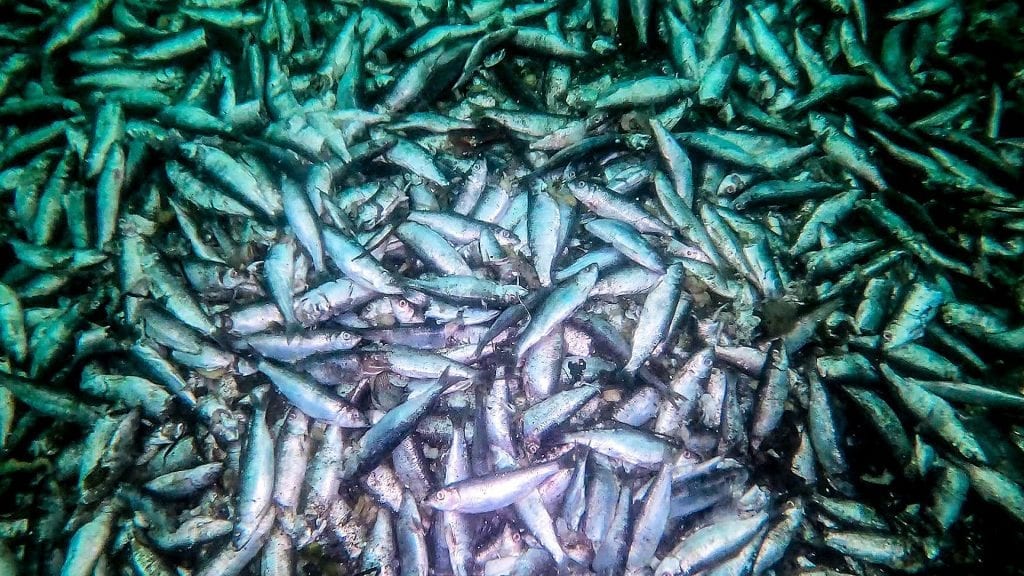
Thousands of herring were allegedly dumped by a commercial fishing boat, amplifying ongoing concern about the practices and impacts of herring fisheries. Photo courtesy: Rebecca Benjamin-Carey
As concerns swirl around dwindling herring stocks in the Salish Sea, a boat load of herring carcasses has been discovered off the east coast of Vancouver Island.
On Friday, the volunteer group Conservancy Hornby Island (CHI) received an anonymous email alleging that a commercial fishing vessel had dumped the load of dead herring at the Deep Bay Marina located central East Vancouver Island.
“If you haven’t already been informed, a commercial boat dumped its load of herring in Deep Bay after the packer refused to accept it,” the email addressed to CHI read.
Rebecca Benjamin-Carrey and Dagen Mutter from CHI responded to the tip off, and drove to Deep Bay Marina with diving gear and a video equipment. Once there, they confirmed that indeed the sea-bed was covered in dead discarded herring.
Benjamin-Carey is a herring conservation campaigner and videographer. When she arrived at the Deep May Marina, she says she dove under water with her GoPro and captured footage of tens of thousands of fish, leading right up to the government Dock and boat ramp.
Benjamin-Carey says the area covers approximately 81 square metres (900 square feet).
“This is just an approximation, but that would make it about two-and-a-half tons of herring dumped,” she says, adding that the conservancy group is also concerned about why the fish were dumped.
“If the packing ship did refuse it, why did they refuse it?” asks Benjamin-Carey.
Locky Macleans, another herring advocate at CHI, suggests: “The herring may have spawned out as they were caught and were no longer of any commercial value to the roe fishery.”
Alive, the herring would have returned to spawn up to eight more times, with each female spawning approximately 20,000 eggs each season, says Benjamin-Carey.
“The role of herring in the marine web is invaluable,” she says.
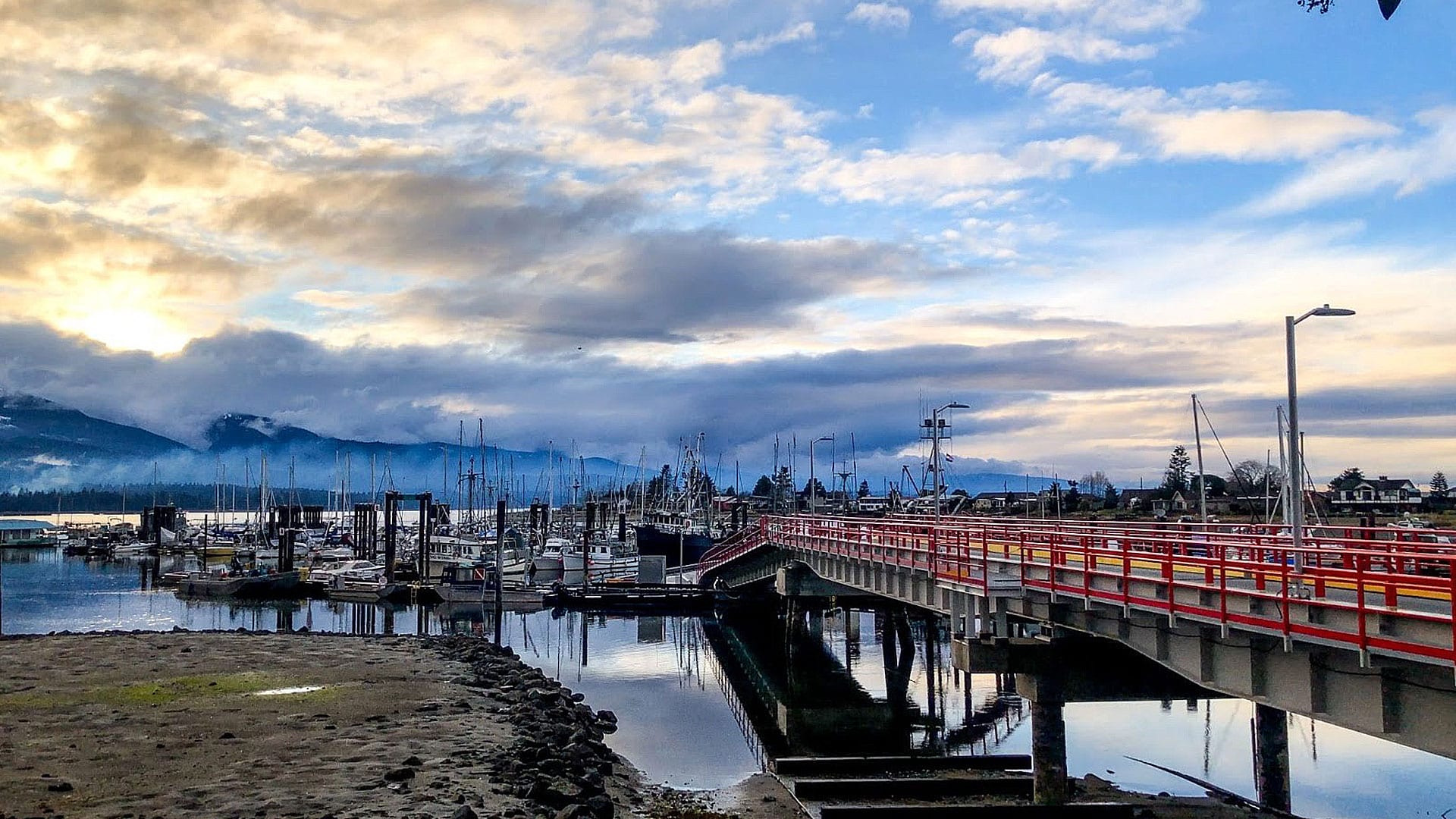
According to CHI, the organization tried contacting Fisheries and Oceans Canada (DFO), as well as the Deep Bay Marina management, where cameras are in place, to find out which vessel was responsible for the dump.
“In the location that we found the herring, there were cameras pointing from different directions. So it was surely caught on tape,” says Benjamin-Carey.
IndigiNews reached out to the Deep Bay Marina manager, who said they are not able to provide further information.
Global Fishing Watch, a website that tracks commercial fishing boats, shows what boats were working the Deep Bay area during the fishery, as well as docking.
The smaller boats and gillnetters are associated with these tracked boats, Benjamin-Carey says, meaning it is possible for the DFO to investigate and identify who dumped the herring.
“DFO keeps saying it’s a well-managed fishery,” says Benjamin-Carey. “Whatever happens in this circumstance will be quite telling — how are they actually managing their fisheries and how much are they paying attention to the herring roe fishery?”
https://youtu.be/6bQXwdXu0F8
DFO Communications Advisor Alexandra Coutts says the department is aware of an alleged dumping incident that occurred on March 19 in Deep Bay.
“DFO’s conservation and protection fishery officers are currently investigating this incident,” Coutts writes. “Subsection 34 (2) of the Fisheries (General) Regulations prohibits commercial fishers from dumping any catch that has been caught in accordance with the Fisheries Act from their vessel.”
As the investigation is ongoing, she says they do not have any further specific details to share at this time.
“As part of DFO’s work to end illegal activity, the Department asks the public for information on any contravention of the Fisheries Act and regulations. Anyone with information can call the toll-free violation reporting line at 1-800-465-4336, or email the details to [email protected],” she writes.
Shared concerns about herring fisheries
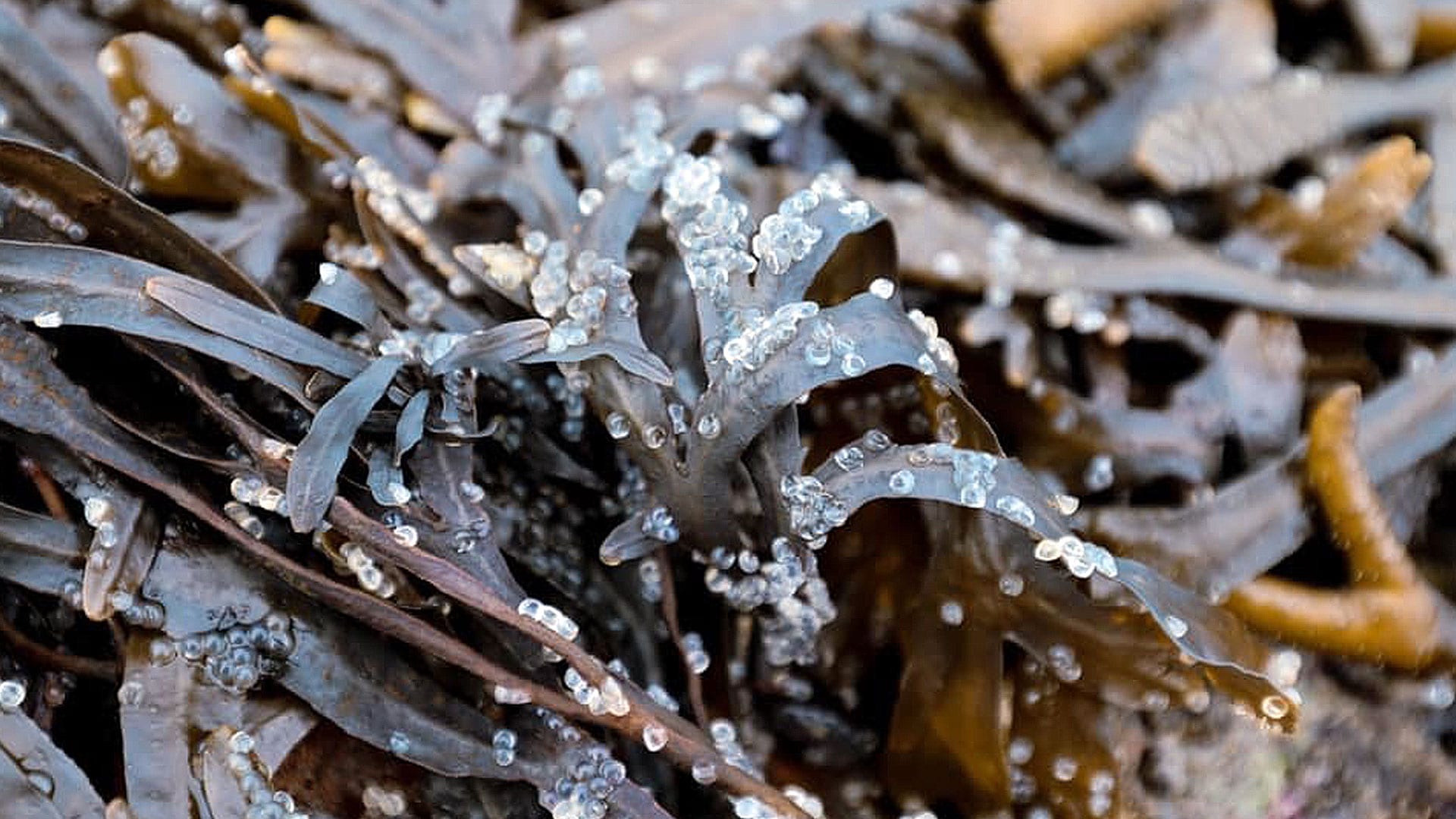
On March 9, DFO opened the commercial herring roe fishery in the Strait of Georgia. CHI has urged DFO for a moratorium or strict limit on the herring fishery in this region due to a 60 per cent decline in stocks.
Herring are a keystone species, a foundation food source impacting many species. Eighty per cent of Chinook salmon diet is herring, and over 80 per cent of endangered southern resident orcas diet is Chinook, research has found.
“Herring really are the foundation of everything we care about in the ocean, in the Salish Sea. They’re small, and overlooked,” says Benjamin-Carey. “People might not notice them right now, but when they’re gone, it would be an environmental catastrophe.”
“And we are at risk right now of losing them. This is the last, there’s only one viable herring spawn left, and it happened here in the Strait of Georgia. So people do need to pay attention now and change has to happen now.”
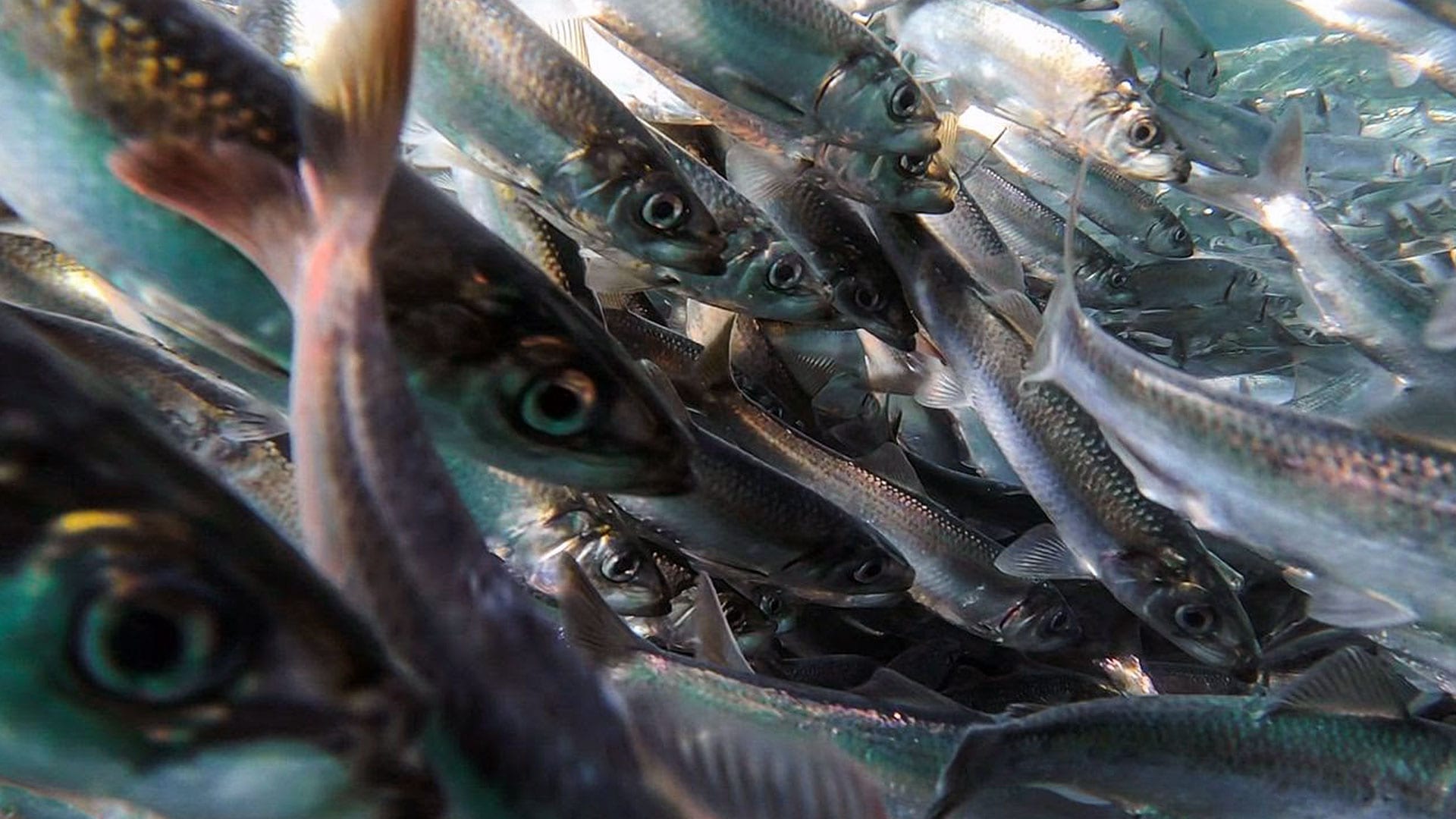
The majority of the herring that are caught in the herring roe fishery is not for human consumption, researchers found in a study at the School for Resource and Environmental Studies, Dalhousie University.
The study says roe is removed from 12 per cent of the catch, while the remaining fish (88 per cent) are ground into fish farm food or pet food.
“It’s a waste, it’s just going to fish farms, which is another whole issue in itself, and then the pet food,” Benjamin-Carey says.
Hereditary Chief of Tsawout of the W̱SÁNEĆ Nation, Chief Eric Pelkey says it’s “criminal” to waste this valuable species.
“At this time the First Nations peoples are being denied access to herring as a food resource, it is criminal to see such a blatant waste,” Pelkey tells IndigiNews in an email.
“The denial of seafood sustenance is causing a widespread decline in the health and well being of First Nations all along our coastlines, but we in the Salish Sea Region are the most critically impacted,” he says.
Other Nations along the herring coast share the chief’s concerns for herring.
Tla’amin First Nation territory is in fishery management Area 15, to the north in the upper Strait of Georgia. Representatives from Tla’amin are urging DFO to control commercial fishing of herring roe. They say they are concerned DFO will try and open their waters to commercial herring roe fishers and are prepared to protect their territory.
Chief Hegus John Hackett from the Tla’amin Nation says “there needs to be a penalty mechanism to implement on industry for catastrophic waste of a rare and valuable resources of herring.
“There is no excuse for such a waste of a precious resource,” Hackett writes. “This needs to stop, and it will stop if we join together and make things right. We need to invest in habitat restoration.”
On March 5, Gwa-sala ’Nakwaxda’xw Nation filed an injunction application seeking to stop a DFO decision to grant a commercial herring spawn on kelp license in their territory in and around Smith Inlet, where they have six reserves that include traditional village sites and fishing stations.
“Despite past experience, we continue to be surprised by the way DFO ignores our input and concerns,” says elected Chief Paddy Walkus in the March 9 press release announcing the injunction.
“For years now, we have not exercised our food fishery for herring spawn out of concern for conservation of dwindling herring numbers. Now DFO have made a decision that they can issue a commercial license in the heart of our homelands over our concerns.”
“The federal government talks a lot about rights recognition and reconciliation, but the Department of Fisheries and Oceans continues to interfere with our access to the principle food and economic base of our people — while favouring the interests of others,” says Walkus.
“This is not what reconciliation looks like.”




